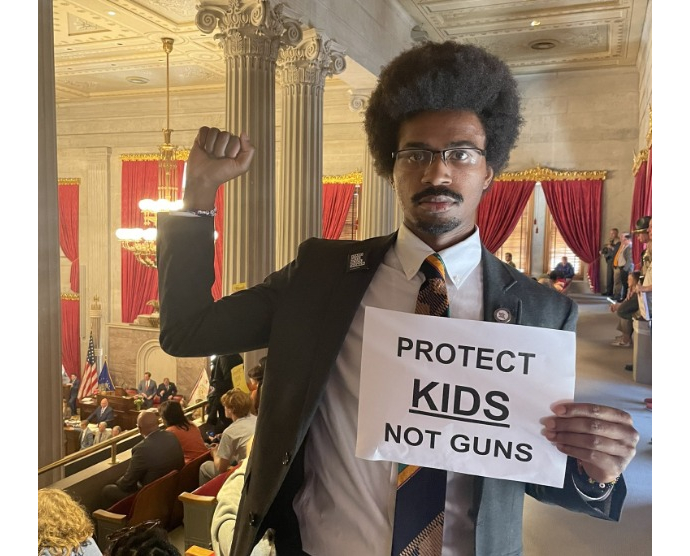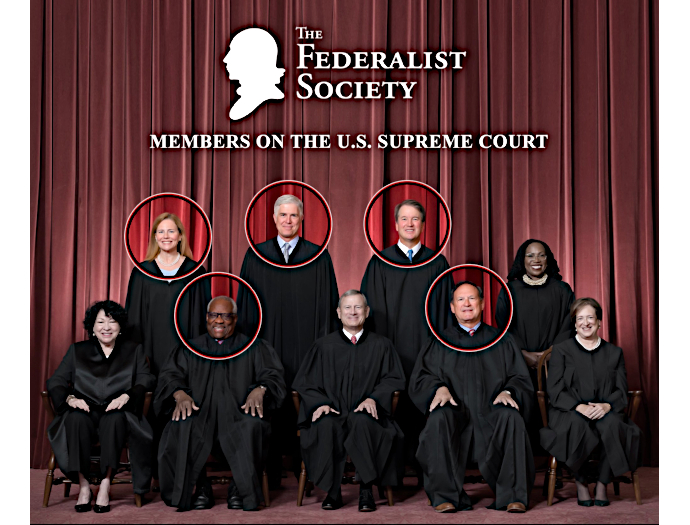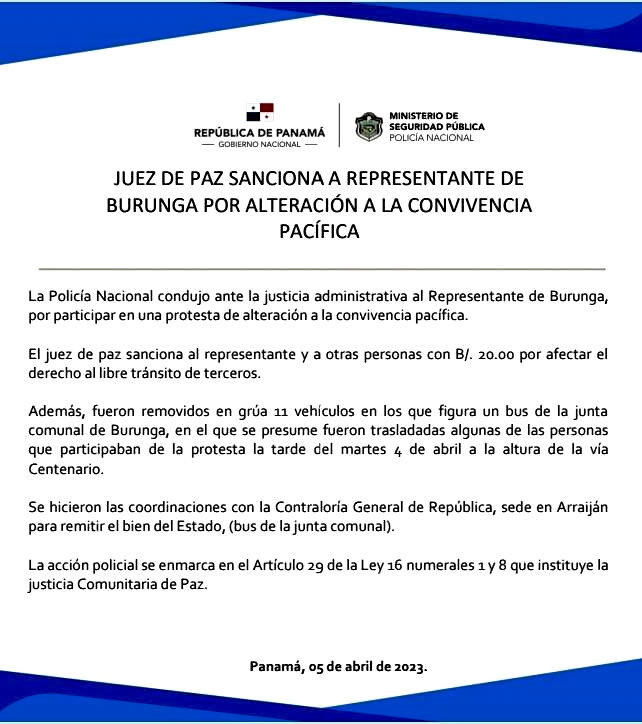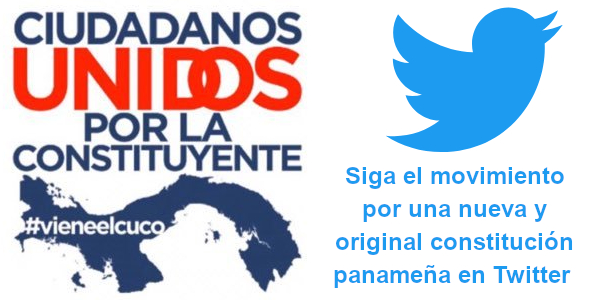20 razones para rechazar el nuevo contrato con Minera Panamá
por el Movimiento Panamá Vale Más Sin Minería
1) La minería metálica no es viable ni sostenible en un país con la riqueza hídrica y de biodiversidad y la vulnerabilidad climática de Panamá. Este contrato no solo explota esta depredadora actividad en Colón, sino que, según su propio texto, “crea el marco de referencia para futuras concesiones similares” (Sección del Considerando). Al respecto, exigimos que se cumpla el compromiso incluido en el Pacto Bicentenario de aprobar el Anteproyecto de Ley No. 102, por la cual se declara una moratoria para la exploración y explotación de minería metálica en todo el territorio nacional.
2) Nos enfrentamos a otra aberración jurídica. El Gobierno se mantiene en desacato. La Corte ordenó proceso licitatorio justo, no contratación directa. El Decreto 267 de 1969, por el cual se establece un régimen jurídico especial para el otorgamiento de concesiones mineras en la zona de yacimientos de Petaquilla, Botija y Río del Medio, vigente nuevamente tras el fallo de la Corte Suprema de 2017, exige que haya concurrencia de interesados. Los numerales 5 y 6 del artículo 257 de la Constitución Política exigen que las concesiones mineras se otorguen conforme a la Ley. Adicionalmente, mientras se completa la aprobación del nuevo contrato la mina continúa operando sin un contrato vigente. Exigimos al Ministerio Público intervenir de inmediato.
3) La negociación del contrato no fue transparente y la consulta pública iniciada no cumple con las normas internas y los estándares internacionales aplicables. Conforme al Acuerdo de Escazú, aprobado por la Ley 125 de 2020, las autoridades están obligadas a tomar en cuenta los resultados de la participación, a que los comentarios sean considerados y contribuyan al proceso de toma de decisión; sin embargo, el Ministerio de Comercio e Industrias no ha considerado la posibilidad de realizar cambios al texto acordado y tampoco parece haber contemplado suficiente tiempo para procesar los comentarios recibidos.
4) El contrato incluye la obligación de aprobar concesiones para la exploración y posteriormente extracción de oro, plata y molibdeno (Cláusula Primera, Cláusula Cuarta B.4.) a afiliadas de Minera Panamá.
5) El nuevo contrato pudiera llegar a duplicar el tiempo de concesión del anterior. En lugar de un máximo de 35 años restantes bajo el contrato anterior, el nuevo contrato reinicia en 2021 el conteo de un periodo de duración inicial de 20 años, con una prórroga casi automática de 20 años adicionales y luego la posibilidad de otorgarse una prórroga adicional por el tiempo acordado por las partes (Cláusula Segunda).
6) Además de 12,955.1 hectáreas concesionadas para la extracción de cobre y minerales asociados, el nuevo contrato incluye más de 4 mil hectáreas adicionales para la operación del proyecto, llevando el área total de uso y servidumbre a 17,780.38 hectáreas, ahora incluyendo la instalación de manejo de relaves. Sin embargo, esto no representa ni la huella total del proyecto ni le pone un techo al tamaño de la operación de la mina, a pesar de estar en medio del Corredor Biológico Mesoamericano y el Area Protegida de Donoso. Esta superficie no incluye la línea completa de transmisión y su servidumbre, la carretera completa hacia el puerto, toda la sección de puerto, concesión de fondo de mar y todas las actividades conexas que requiere el proyecto, que ocupan más de 2 mil hectáreas adicionales. Asimismo, diferentes numerales de la cláusula tercera permiten el desarrollo de actividades conexas sin limitación de superficie (Cláusula Tercera, Sexta B, Anexo 1).
7) El contrato contempla amplias facultades a favor de la empresa para adquirir, arrendar o usufructuar tierras de EL ESTADO o de propiedad privada sin límite, dentro o fuera de la concesión. El Estado se compromete igualmente a expropiar las tierras que sean necesarias si la empresa no puede llegar a un acuerdo con los propietarios. (Cláusula Tercera, numerales 19 y 14). A pesar de ello se ha afirmado lo contrario ante la preocupación de los miembros de la comunidad.
8) El contrato otorga a la empresa el derecho de solicitar a la Autoridad de Aeronáutica Civil que emita restricciones de vuelo temporales o permanentes a terceros sobre el Área de la Concesión hasta 3,000 metros de altura sobre el nivel del mar, por motivos de seguridad. La disposición deja un amplio margen para discrecionalidad de la empresa, que podría ser utilizado para impedir que los medios de comunicación y la población conozcan sobre los impactos e irregularidades del proyecto. Esta disposición agrava el cerco que por tierra impide que se conozcan las verdaderas condiciones del área del proyecto. (Cláusula Tercera, numeral 9)
9) Se menciona, pero no se identifica, cuáles serían las “buenas prácticas de la industria” a las que la empresa debe acogerse (Cláusula Décima, Trigésima Octava, Quincuagésima Segunda). El contrato no compromete a Minera Panamá a someterse a procesos de revisión independientes, estandarizados a nivel internacional.
10) El principal argumento utilizado por gobierno-empresa ha sido el de que existe una cantidad fija de dinero garantizado con la operación. Casi el único argumento que se ha mantenido por todos los representantes es el asunto del dinero. Lo que dice el contrato, por el contrario, implica que ese dinero, denominado Ingreso Mínimo Garantizado (IMG) y cuantificado como 375 millones de dólares se puede disminuir por múltiples razones, como la baja del precio del cobre en el mercado (Cláusulas Décima Cuarta y Décima Quinta), con la posibilidad de que se pueda usar una regalía mínima de 2%, regalías como en el contrato de la ley 9 de 1997(Cláusula novena).
11) El contrato contempla la posibilidad de que la empresa entre en un periodo de suspensión de operaciones por bajas del precio del cobre en el mercado internacional o alzas imprevisibles de costos hagan que no sea económicamente rentable la explotación del Proyecto. Esta suspensión podría ser por un periodo de 48 meses (4 años) a la concesionaria durante los primeros 20 años y 48 meses más durante los siguientes 20 años, con solo notificar al Estado y mantenerlo informado. (Cláusula Cuadragésima Octava). Considerando lo fluctuante que es el mercado de los metales, y los precedentes de la industria, es casi imposible que en 40 años no se den bajas en el precio de los metales. Sin embargo, el contrato no establece el manejo con relación a los trabajadores que quedarían cesantes por un tiempo tan extenso.
12) El contrato esconde además otro incentivo fiscal, la deducción por agotamiento de la reserva. En el enfoque dado por el contrato, la paulatina pérdida del material del yacimiento es contabilizada como una pérdida económica para la empresa, cuando es una pérdida en el patrimonio del país. A través de este mecanismo se permite a la empresa deducir en su declaración de renta, la pérdida de valor del yacimiento a causa de su explotación, y así pagar menos impuesto sobre la renta. El contrato establece que el Estado permitirá a la empresa deducir hasta el 70% de sus ingresos netos por agotamiento de los recursos mineros hasta diciembre del 2031, y hasta el 30% a partir de 2032. Así el pueblo panameño terminaría subsidiando a la empresa. (Cláusula Décima Segunda).
13) Es inaceptable que sean inaplicables a la empresa los cambios en el régimen fiscal que se adopten a futuro (Cláusula Décima Primera); que se otorgue nuevamente exoneraciones al impuesto de importación (Cláusula Décima Octava); que se le concedan 750 millones de dólares en créditos fiscales, para su uso a razón de 37,500,000 por año (Cláusula Décima Novena); y que se conceda una deducción de hasta el 70% de la renta neta gravable por agotamiento de recursos mineros; y de 30% a partir de 2032 (Cláusula Décima Segunda). Todas estas condiciones significarían que el Ingreso Mínimo Garantizado para Panamá no esté realmente garantizado.
14) El contrato indica que prevalecerá por encima de las normas del Código de Trabajo. Se menciona el reconocer el principio de libertad sindical, sin embargo, el contrato no es taxativo en cuanto al derecho de negociación colectiva (Cláusula Vigésima Tercera). El contrato no es explícito en materia de riesgos profesionales y laborales, a pesar del alto riesgo ocupacional en la actividad. Tampoco establece responsabilidades frente al impacto negativo que genera esta actividad en la salud (en el marco del trabajo y retiro de obreros) o financiero (presupuesto para atender las secuelas de los trabajadores como de la población).
15) Las obligaciones ambientales aceptadas por la empresa se reducen al cumplimiento del estudio actual de impacto ambiental y de los instrumentos de gestión vigentes, que no son específicos para minería y su operación. Es injustificable que se apruebe un nuevo contrato sin que la mina cuente con un plan de cierre y con la culminación de los procesos sancionatorios por las graves infracciones ambientales de la empresa. (Cláusula Vigésima Quinta).
16) El contrato dispone que en caso de discrepancia entre el monitoreo de calidad de agua del Ministerio de Ambiente y la empresa, se tendrá que buscar a un tercero que dirima las diferencias, lo que desconoce que el criterio emitido por un funcionario idóneo del ministerio es plena prueba conforme a la Ley General de Ambiente. (Cláusula Vigésima Quinta). Además de la limitada capacidad de fiscalización que podrá suponer la Oficina Especial del Estado que contaría solo con 6 funcionarios para un proyecto de más de 20 mil hectáreas. (Cláusula Trigésima Séptima).
17) Se pactó un pago anual de 2 millones de dólares por el uso de 100 millones de metros cúbicos de agua, pero este consumo no coincide con los volúmenes reales reportados en el informe ambiental de la empresa (Environmental Social and Governance Report 2021), donde se ilustra que el consumo de agua dulce fue de 1.380 millones de m3 y 438.06 millones de m3 de agua de mar. Tampoco indica el contrato el método de monitoreo de este consumo. (Cláusula Trigésima Quinta)
18) En materia de energía, la empresa se compromete a incorporar fuentes de energía alternas y a reducir la producción de carbono en los próximos años, sin establecer tasas medibles. Se incluye cualquier otra fuente, como el gas. Se establece la obligación de la empresa de efectuar acciones para enfrentar el cambio climático, pero con acciones difusas que no se concretan en ninguna obligación real (Cláusula Trigésima Sexta).
19) No queda claro que las obligaciones laborales y ambientales del proyecto sean obligaciones esenciales que puedan motivar la resolución del contrato, ya que el término no está definido. La cláusula solo detalla claramente que constituyen incumplimientos lo relativo al impago de regalías, impuestos y fianzas (Cláusula Cuadragésima Octava). El rompimiento de cola de relaves, derrames, contaminación o daño ambiental tampoco fueron incluidos en las causales de resolución del contrato.
20) El contrato permite a la empresa solicitar que se catalogue como restringida la información recibida por las autoridades con relación a los beneficiarios finales de la empresa. Esta información es fundamental para el cumplimiento de la Constitución y prevención de conflictos de interés (Cláusula Quincuagésima).
Organizaciones miembro del Movimiento Panamá Vale Más Sin Minería:
ADOPTA El Bosque
Asociación Centro de Estudios y Acción Social Panameño (CEASPA)
Amigos del Parque Nacional Santa Fe (AMIPARQUE)
Amigos del Parque Internacional La Amistad (AMIPILA)
Asociación de Educadores Veragüenses (AEVE)
Asociación de Profesores de la República de Panamá (ASOPROF)
Centro de Capacitación Social (CCS)
Centro de Incidencia Ambiental (CIAM)
Coalición Internacional de Mujeres y Familias (CIMUF)
Colectivo Voces Ecológicas (COVEC)
Colegio de Biólogos de Panamá (COBIOPA)
Consejo Consultivo de la Cuenca Chagres – Alajuela / Jóvenes por el Ambiente y la
Cuenca del Canal
Coordinadora para la Defensa de Tierras y Aguas de Coclé (CODETAC)
Coordinadora por la Defensa de los Recursos Naturales y Derechos del Pueblo Ngäbe
Buglé y Campesino
Cuidemos a Panamá
Espacio de Encuentro de Mujeres (EEM)
Frente Santeño contra la Minería
Fundación Balu Uala
Fundación Cerro Cara Iguana
Fundación para el Desarrollo Integral Comunitario y Conservación de los Ecosistemas de Panamá (FUNDICCEP)
Fundación para la Protección del Mar (PROMAR)
Fundación Pro- Conservación de los Primates Panameños (FCPP)
Fundación San José Verde (FUSAVE)
Guardianes del Río Cobre OBC
Movimiento Democrático Popular (MDP)
Movimiento MiMar
Movimiento Pro-Rescate de AECHI
Movimiento Victoriano Lorenzo
Movimiento Ya es Ya
Observatorio Panameño de Ambiente y Sociedad (OBPAS)
Poder Ciudadano
Red Nacional en Defensa del Agua (RNDA)
Red Ecológica, Social y Agropecuaria de Veraguas (RESAVE)
Sindicato de Educadores Democráticos de Panamá
Sociedad Audubon de Panamá
Sociedad Panameña de Salud Pública (SPSP)
Contact us by email at / Contáctanos por correo electrónico a fund4thepanamanews@gmail.com
To fend off hackers, organized trolls and other online vandalism, our website comments feature is switched off. Instead, come to our Facebook page to join in the discussion.
Para defendernos de los piratas informáticos, los trolls organizados y otros actos de vandalismo en línea, la función de comentarios de nuestro sitio web está desactivada. En cambio, ven a nuestra página de Facebook para unirte a la discusión.
~ ~ ~
These announcements are interactive. Click on them for more information.
Estos anuncios son interactivos. Toque en ellos para seguir a las páginas de web.

























